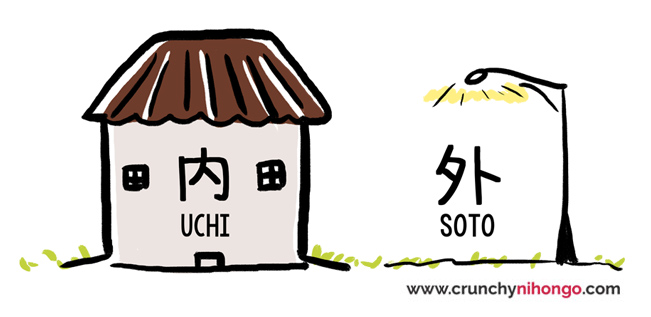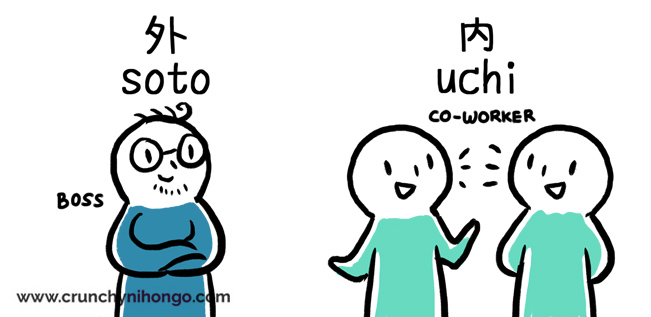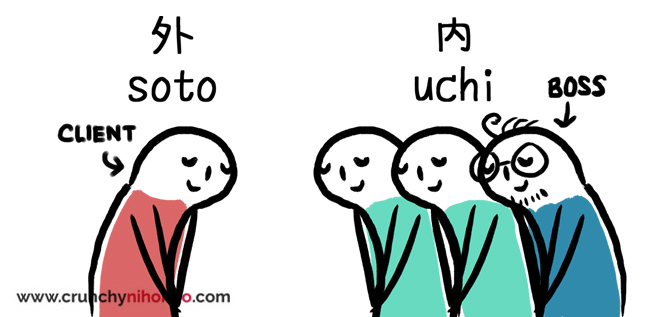Hi ! We hope this site helps you! ٩(ˊᗜˋ*)و As an Amazon Associate, we earn from qualifying purchases without additional cost. Click to read more about our Privacy Policy or Affiliate Disclosure
It is not possible to fully understand a language without learning about it’s culture. Uchi and Soto is one of the most important aspect that you need to know in your journey to learn Japanese. So, what are they ?
In case you didn’t know, there are a few types of way to talk in Japanese. Think about the standard English and the Queen’s English. Now, in Japanese, it is divided as casual Japanese and Keigo.
Keigo is a polite way of talking and it is very important if you’re going to use your Japanese in business environment. You cannot use casual language or you will be considered as rude. But Keigo also divided into a few types. They are the standard polite type, humble language, and honorific language. Even if you use Keigo in business situation, if you use the wrong type, you will also be considered as rude, so make sure to study a lot about Keigo before you jump into the real situation.
Why are we talking about Keigo while the topic was about Uchi and Soto?
It’s because the concept of Uchi and Soto is what create the different tone in way of talking. Uchi 内 means “inside” while Soto 外 means “outside”. Think about back when you’re in school or something. You must have been inside a group or circle of friends right? And you treat your gang member differently than the outsiders. That is how it works in Japan.

The idea of Japanese is to treat “outsider” with a very high respect and not to show their true feeling to them. While it is okay to treat “insider” casually and to be honest to tell what they really want. So don’t be worried, treated as “outsider“, they will give you a lot of respect instead of being ignored. But if you give them a present and they say they like it, it might not be their true feeling they’re telling you about. They just try to be nice to you.
As a note, as a foreigner or traveler, Japanese will always treat you as Soto and it’s very hard to penetrate into the Uchi group. Although it’s not impossible, it will require a lot of effort.
Understanding the groups
This Uchi & Soto system is also unique, they change depending on the circumstances. But it’s quiet logical so it’s not that hard to understand. Basically it’s about “insider/outsider” of a certain group in a situation.
In normal situation, your family,close friends, and relatives would be Uchi while the other people will be Soto. This one is simple.
The business situation is more complex. Within your division, any people below the boss will be Uchi while the boss and other superior member is Soto. So you may talk casually or express your opinion freely with co-worker but you will need to be more respectful to the boss.

But when talking with people from another office, the situation has changed, now all people in your company would be Uchi while people from other office is Soto. So when you’re talking with other people from other company, it’s preferred to drop the honorific and use the humble way of talk even when you’re talking about your boss since he is now considered a part of the company “family” in this situation.

If you enjoy Japanese manga/drama/anime, we’re sure that you have seen a lot of scene where someone become friends or starting a relationship and they start to use first name instead of the last (family) name to call on each other. Also scenes where someone complain “Why are you so polite?”. That’s the concept of Uchi & Soto in action~
What’s in it for me?
Armed with this new knowledge, you should learn to analyze the situation more properly and being careful when saying up words to avoid being considered as rude~ As a foreigner, in most cases you’ll be Soto so they will talk politely to you and you also should reply politely to them.
We hope this article give you a better understanding toward this unique Uchi-Soto concept in Japanese. Happy learning! 。゚✶ฺ.ヽ(*´∀`*)ノ.✶゚ฺ。
